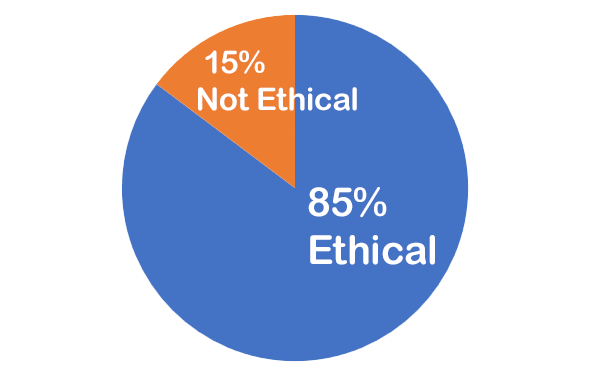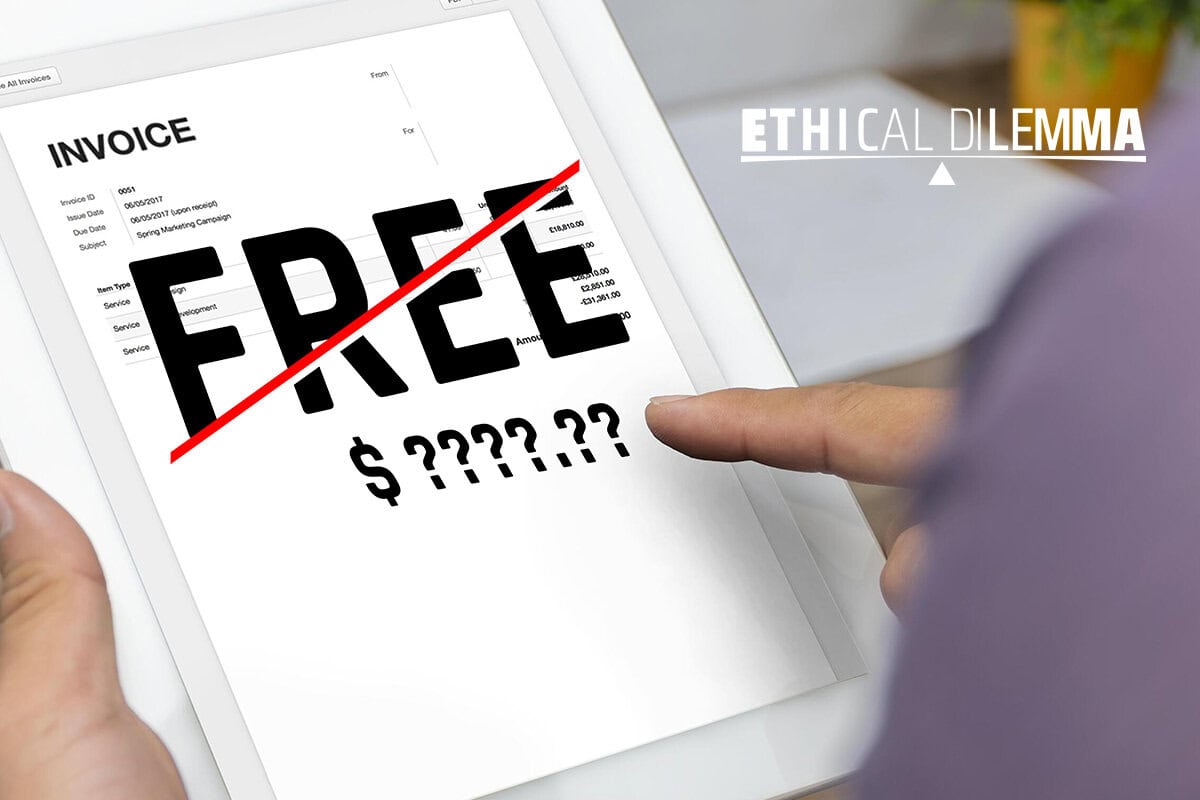This is the June 2024 edition of our monthly series of Ethics case studies titled What Do You Think? This series is comprised of case studies from NSPE archives, involving both real and hypothetical matters submitted by engineers, public officials, and members of the public.
Your peers and the NSPE Board of Ethical Review have reviewed the facts of the case as shown below. And, here are the results.
Your opinion has been registered for the June 2024 edition of our monthly series of Ethics case studies titled What Do You Think?
Your vote is recorded as:

Want to know how your peers voted? We’ll send you an email with the poll results on
June 25.
Your opinion has been registered for the June 2024 edition of our monthly series of Ethics case studies titled What Do You Think?
Your vote is recorded as:

Want to know how your peers voted? We’ll send you an email with the poll results on
June 25.
A Review of the Facts
Engineer Brown was the founding principal of a firm named “Brown Engineering,” and later Engineers Smith and Jones were employed by Brown Engineering. In 2010, Engineers Smith and Jones bought the firm of Brown Engineering from Engineer Brown. Engineer Brown stayed on as a consultant until 2015 when he retired. From 2010 until 2020, Engineers Smith and Jones continued to call the firm Brown Engineering.
During that entire period (2010-2020) while being considered for work, Engineers Smith and Jones, in promoting the firm, indicated to clients that the firm was responsible for certain projects done during the 1980s and 1990s. The truth is that Engineers Smith and Jones only joined the firm in 1990 and only worked on a few of the projects cited, but the firm did in fact perform the work that they claimed it had.
What Do You Think?
Was it ethical for Engineers Smith and Jones to continue to call the firm Brown Engineering after Engineer Brown was no longer a principal in the firm and indicate to the clients that the firm was responsible for certain projects done prior to their association with the firm?
Here is the result of our survey of your peers:

Applicable NSPE Code References:
II.5.a
“Engineers shall not falsify their qualifications or permit misrepresentation of their or their associates’ qualifications. They shall not misrepresent or exaggerate their responsibility in or for the subject matter of prior assignments. Brochures or other presentations incident to the solicitation of employment shall not misrepresent pertinent facts concerning employers, employees, associates, joint venturers, or past accomplishments.”III.3.a
“Engineers shall avoid the use of statements containing a material misrepresentation of fact or omitting a material fact.”
Discussion
The facts of this case are not unusual and, in fact, are quite common, not only in the field of engineering, but also in the practice of law, architecture, and other professional fields. Frequently a firm name contains the name of a principal who is well respected, sought after, and thus extremely valuable to the firm. When this member of the firm ceases to be associated with the firm for one reason or another, the firm is faced with a choice. The firm may either remove the name from the firm name, in which case the prestige and the honor associated with it are lost, or the firm may continue to use the name, in which case there is a danger that the public might assume the individual is still associated with the firm.
There is the question of the promotion of the firm to indicate that the firm was responsible for work done prior to the current principals’ association with the firm. These points will be addressed individually.
The Code of Ethics very clearly states that engineers should avoid the improper solicitation of professional employment (Code II.5a) or statements containing a material misrepresentation of fact or omitting a material fact necessary to keep statements from being misleading (Code III.3.a.).
Taken as a whole these provisions provide engineers with a good deal of guidance with regard to the question posed by the facts in this case. An engineering firm is a group of professional engineers who have banded together to provide engineering services to clients. While it sometimes is true that certain individual members of the firm are so-called “movers and shakers,” who are extremely valuable and add prestige to the firm, the name of the firm is generally associated more with the firm as a whole than with any of its individual members. The name or names contained in a firm’s title, while very important, are for the most part a symbolic representation of the quality of services provided by that firm as a whole. While it is true that certain clients continue to choose a firm because of the continued presence of a member of the firm, it is also true that the quality of services rendered by a firm is generally a reflection of the firm team comprised of several members of the firm.
Applying this analysis to the facts present in this case, it appears that Engineers Smith and Jones were not acting improperly when they continued to use the name Brown Engineering as the name of their firm. Brown Engineering, while a direct reference to Engineer Brown, was also the name of a team of engineers of which Engineers B, C, and other engineers were a part. In the minds of the public and clients, Brown Engineering represented an assortment of engineers and engineering services. When Engineers Smith and Jones purchased the firm, they purchased a “package” which included the identity and goodwill of the firm. It is our view that they acted ethically in calling the firm Brown Engineering after Engineer Brown was no longer a principal in the firm.
As to the second point, we are a bit more concerned with the statements made by Engineers Smith and Jones concerning the work performed by the firm. While, as has just been stated, the firm is a symbolic representation of the quality of services rendered by a group, it is also true that the firm as currently constituted is owned and managed by individuals who were not responsible for the projects performed during the 1980s and 1990s. Nevertheless, it is the opinion of the Board that as long as Engineers Smith and Jones, in promoting Brown Engineering, indicate to prospective clients that it was the firm, and not Engineers Smith and Jones individually, that was responsible for certain work done prior to their association with the firm, we conclude that such statements would be ethically proper. This recognizes that the firm is a continuous, ongoing, and living entity with a history and reputation, while at the same time acknowledging that particular individuals who are no longer associated with the firm may have been partially responsible for that history and reputation.
The Ethical Review Board’s Conclusion

It was ethical for Engineers Smith and Jones to continue to call the firm Brown Engineering after Engineer Brown was no longer a principal in the firm and to indicate to clients that the firm was responsible for certain projects done prior to their association with the firm.
BOARD OF ETHICAL REVIEW
F. Wendell Beard, P.E. Robert J. Haefeli, P.E. Ernest C. James, P.E. Robert W. Jarvis, P.E. James L. Polk, P.E. J. Kent Roberts, P.E. Alfred H. Samborn, P.E., chairman
Note – In regard to the question of application of the Code to corporations vis-a-vis real persons, business form or type should not negate nor influence conformance of individuals to the Code. The Code deals with professional services, which services must be performed by real persons. Real persons in turn establish and implement policies within business structures. The Code is clearly written to apply to the Engineer and it is incumbent on a member of NSPE to endeavor to live up to its provisions. This applies to all pertinent sections of the Code. This opinion is based on data submitted to the Board of Ethical Review and does not necessarily represent all of the pertinent facts when applied to a specific case. This opinion is for educational purposes only and should not be construed as expressing any opinion on the ethics of specific individuals. This opinion may be reprinted without further permission, provided that this statement is included before or after the text of the case.









Yes it is Ethical. If I buy a Ford F-150 truck, I have no expectation that Henry Ford was personally involved in any aspect of its design and manufacture, and Ford Motor Company does not make any representations that he did. Similarly, as long as the principals and employees of Brown Engineering do not make any representations concerning current involvement of Engineer Brown in Brown Engineering there is nothing Unethical in the continued use of the Brown Engineering name.
The new name could be Brown Associates, PLC
Of course it’s ethical! Kenny (above) is absolutely correct.
The story suggests Brown Engineering has been around for a while and is big enough to employ (presumably) more than the three people named. If so, several things are likely:
1) Mr. Brown did not do the majority of the work on every project that his namesake company touts. (To suggest he did would clearly be unethical.)
2) A good number of the people who worked on these projects have probably moved on, retired or died. (No one suggests erasing their contributions when their employment terminated because they’re no longer contributing.)
None of that negates the accomplishments achieved under the umbrella of the company. Given how companies merge, acquire, divest, the future company name most assuredly will not contain the names Brown, Smith or Jones 100 years from now. So, what’s in a name? That which we call a rose by any other name would smell as sweet.
When a particular Engineer with special knowledge / expertise leaves a firm, that firm technically cannot / should not claim that expertise, however, this occurs very frequently in our profession, and without giving credit to the Engineer. However unethical this may be it seems our profession is very accepting of the practice. On the flip side, when that particular Engineer promotes his expertise / projects he has contributed to after leaving the original firm, the original firm requires him to qualify that his expertise was performed for / through the original firm. It has always seemed to me to be a double standard, as the talent actually stays with the Engineer regardless of where he applies his expertise.
I don’t see how this is even a question. My experience does not equal the company experience and vise-versa. That should be obvious to all sentient beings. As to Keith Stroh’s statement: “On the flip side, when that particular Engineer promotes his expertise / projects he has contributed to after leaving the original firm, the original firm requires him to qualify that his expertise was performed for / through the original firm,” I don’t see how this is an issue, nor have I personally experienced a former employer coming out of the woodwork to say, “hey you did not give us credit when you should have.” Unless you lied on your resume, you did, and I would consider it very small minded to get a call from some former employer to say I failed to give them credit as a company.
I disagree with Keith Stroh’s comment. When a principal leaves the firm, the firm can still claim that area of expertise. All his calculations and notes may be on file and if the firm was well managed, he trained his replacement. His work was not copyrighted as intellectual property, it’s engineering. Too many professionals fall into this pit of an argument for intellectual property. Also common to instructors at the University level, board notes and other teaching materials are not intellectual property, if they were there is a copyright to back it up or they aren’t. Teaching materials, calculations, and thesis content are often 10 plus generations of cut, paste, and copy from various sources. If one individual engineer is the only source of a particular in demand expertise, it’s because he or she failed to train anyone else to replace him or their communication and people skills are so poor they can entice interest in collaboration. You can license a process, or take out a patent, but if another engineer manages to improve on it with original content, your claim of infringement may well fall on deaf ears.
The above comment should say: “or their communication and people skills are so poor they cannot entice interest in collaboration.”